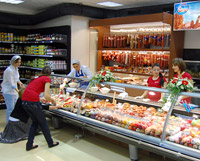The Parliamentary elections already have their impact on the economy. According to the official statistics the lowest inflation rate was recorded in February. Official statistics will record deflation of u number of products. And this may be explained. In spite of the promises given by the RPA, many of the businessmen were nominated. The nominated oligarchs, as importers and producers, understand that restraining the inflation is in their favor. Otherwise the complaints will increase prior to elections. It will lead to unmanageable increase of election bribes. The candidates and parties will spend approximately 80-100 billion dollars will on the upcoming elections. It is a huge amount for pre-election campaigns, party platforms, salaries and election bribes. The experts suppose that elections bribes will increase immensely. According to them, the inflation of the recent years finally increased the election bribe. It is clear that the oligarchs and parties will artificially circulate currency to be able to cover the above mentioned expenses. Thus, the inflation will be going on during the second half of March and at least during the upcoming year, year and a half. Consequently, it will be a vacation period for the Central Bank. On the one hand, there will be additional amount of currency; on the other hand the oligarchs will take the only responsibility of the Central Bank: restraining the inflation. If you consider this as an exaggeration, you should follow the price changes yourselves. A number of imported products got deflated, as different to petrol price, which increased last week. Previously fuel price increase fed inflation. But this time the contrary happened. Of course, it may be explained by the fact that in Armenia the cars mainly use gas. Thus, the petrol price increase doesn’t have any serious impact on transportation of goods any more. And the petrol price increase may be explained by the fact that the petroleum importers are not involved in the pre-electoral intrigues. None of them is running for parliamentary elections. Thus, the fuel importers may “easily” raise the prices. Our government had probably calculated this move as it will give petroleum compensation to the villagers for the spring farm work. It is an original electoral bribe just like the acquittal of land tax obligations. Of course, the international economic institutes criticized our authorities. However, once in every five years our government is ready for everything in order to calm down the social tension, especially when after the elections it gets almost 4 years to tax small and medium entrepreneurship just like our oligarchs do. The oligarchs as well keep the prices of consumer goods stable for 3-4 months before the elections. Several goods even become cheaper. However in a week after the elections the prices increase again. First of all, it concerns the essential commodities. Thus, the economists advise not to get existed with the fall in prices which is recorded in official statistics. It will not have any serious impact in terms of a year. Our statisticians should work hard at the end of the year. Now they write about the increase of turnover for the last two months. It means that the society is buying more goods. On the other hand it is unclear where from they get money to spend. As according to official statistics, the index of turnover is much higher than the index for society’s total income. Some experts explain it with the fact that the process of distributing electoral bribes is already launched. It becomes obvious even if we look at the economic indexes of the country. The electoral bribes are mainly distributed to the needy people and in the form of cash money. This money directly goes to the market. On the one hand it promotes the turnover; on the other hand it is an extra headache for the Central Bank. So, instead of enjoying the imaginary vacations the Central Bank is obliged to elaborate flexible mechanisms in order to manage the amount of cash money. Thus, the elections are a hard work even for those people who are not involved in politics.

